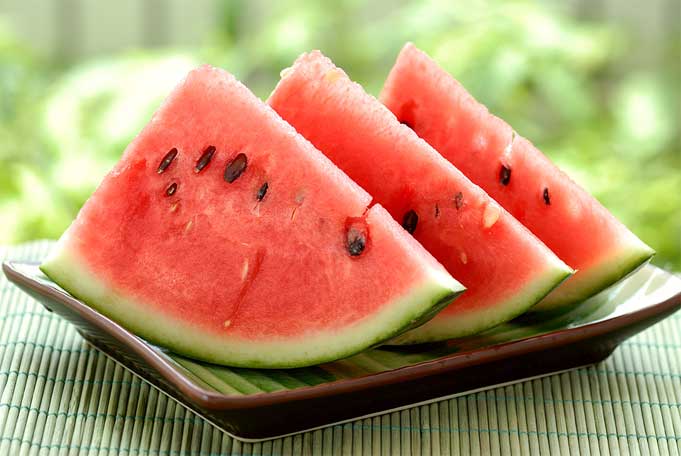Watermelons are mostly water — about 92 percent — but this refreshing fruit is rich with nutrients.
Each juicy bite has significant levels of vitamins A, B6 and C, lots of lycopene, antioxidants and amino acids. There’s even a modest amount of potassium. Plus, this quintessential snack is fat-free, very low in sodium and has only 40 calories per cup.
“Foods that are high in antioxidants and amino acids allow your body to function optimally,” said Angela Lemond, a Plano, Texas-based registered dietitian nutritionist and spokesperson for the Academy of Nutrition and Dietetics .
“Antioxidants help prevent damage, and cancer. Amino acids are the basic building block for protein, and protein is used in virtually every vital function in the body.”
Some health benefits of watermelon are:
Heart health
Watermelon’s high levels of lycopene are very effective at protecting cells from damage and may help lower the risk of heart disease , according to a study at Purdu University. A study published in the American Journal of Hypertension found that watermelon extracts helped reduce hypertension and lower blood pressure in obese adults.
Watermelon may be especially important for older women. A study published in Menopause found that postmenopausal women, a group known to have increased aortic stiffness, who took watermelon extract for six weeks saw decreased blood pressure and arterial stiffness compared to those who did not take watermelon extract.
The authors of the study attributed the benefits to citrulline and arginine.
Arginine can help improve blood flow and may help reduce the accumulation of excess fat.
Anti-inflammatory properties
“The lycopene in watermelon makes it an anti-inflammatory fruit,” Jarzabkowski said. Lycopene is an inhibitor for various inflammatory processes and also works as an antioxidant to neutralize free radicals. Additionally, the watermelon contains choline, which helps keep chronic inflammation down, according to a 2006 article published in Shock medical journal.
Reducing inflammation isn’t just good for people suffering from arthritis. “When you’re sick, you have cellular damage, which can be caused by a variety of factors including stress, smoking, pollution, disease, and your body becomes inflamed,” Jarzabkowski said.
“It’s called ‘systemic inflammation.'” In this way, anti-inflammatory foods can help with overall immunity and general health.
Hydration
“Watermelons help with overall hydration, and that is a great thing,” said Lemond. “They say we can get 20-30 percent of our fluid needs through our diet alone, and foods like these certainly help.”
Additionally, their juice is full of good electrolytes. This can even help prevent heat stroke.
Digestion
The watermelon contains fiber, which encourages a healthy digestive tract and helps keep you regular.
Skin and hair benefits
Vitamin A is stellar for your skin, and just a cup of watermelon contains nearly one-quarter of your recommended daily intake of it. Vitamin A helps keep skin and hair moisturized, and it also encourages healthy growth of new collagen and elastin cells , according to the Cleveland Clinic. Vitamin C is also beneficial in this regard, as it promotes healthy collagen growth.
Muscle soreness & athletic performance
Watermelon-loving athletes are in luck: drinking watermelon juice before an intense workout helps reduce next-day muscle soreness and heart rate, according to a 2013 study published in the Journal of Agricultural and Food Chemistry. This can be attributed to watermelon’s amino acids citrulline and arginine, which help improve circulation.
A 2015 study published in the Journal of Applied Physiology suggests that watermelon’s citrulline may also help improve athletic performance. Study participants who took citrulline supplements saw a boosted performance with more power production in high-intensity exercise like cycling and sprinting.
Cancer prevention
Like other fruits and vegetables, watermelons may be helpful in reducing the risk of cancer through their antioxidant properties. Lycopene in particular has been linked to reducing prostate cancer cell proliferation, according to the National Cancer

